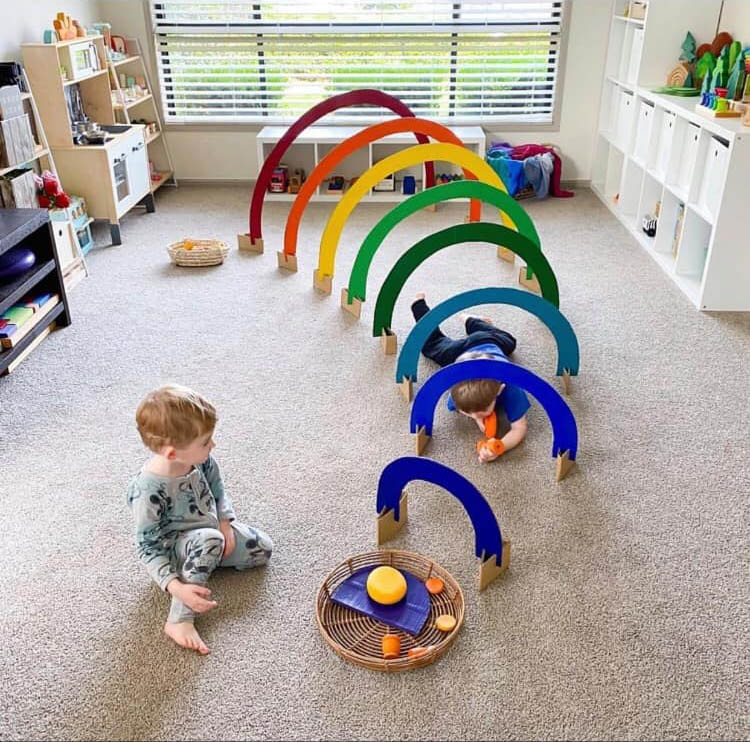Children Progress at Their Own Pace
Children develop many of their physical, social, emotional, and cognitive skills during their early years. There are some milestones associated with typical growing cycles for children birth to five years old. Keep in mind that children progress at their own pace and these milestones are meant to be a general guide. If you have concerns about your child’s abilities, working with your pediatrician or family support worker can help you connect to helpful resources.

What To Expect By Year
Birth to 1 Year
Cries to express needs – parent bonding begins
Begins social smiling
Recognizes parent’s voice
Memory is established
Turns head to voice, smiles in response to smiles, kicks and waves
Begins babbling – strings sounds together (ah, eh, oh)
Genuinely laughs, loves attention
Gestures to communicate – pushing things away, squirming
Likes to play
Recognizes his or her name
Discovers the fingers and toes
Screams to get their own way
Crawls, sits up without support
Uses spoon to feed themselves
Solves simple problems – i.e. knocking over box to a get a toy
Can stand on their own
By 1 Year
Has grown by 10 to 12 inches and the brain has doubled in size
Fears the unfamiliar – people, places, things
Beginning a sense of separate self
Begins trial and error experimentation
Takes first steps
Can move hands in rotation to turn knobs
Plays drop and retrieve games; pat-a-cake
Explores with hands and fingers
Smiles and vocalizes at image in mirror
Says simple words like mama or dada
Responds to simple spoken requests
Has intent behind actions
By 2 Years
Completely self centered, wants to be noticed, likes an audience
VERY assertive, insists on own way
Relates better to adults than children
Talks mostly to self
Mimics adult behavior, repeats words they say
Understands verbal requests
Answers “what’s that?”; understands simple phrases; uses 5 – 50 words
Short attention span; gives up easily but moves on quickly to new things
Loves opposites – up/down, yes/no
imitates simple tasks
Bladder/bowel control begins
Feeds self; grasps cup with two hands
Cuts last teeth
Likes conclusions – shuts doors, closes books
Likes to push-pull objects; carry and dump is a favorite activity
Walks with growing confidence, can find it hard to turn corners
By 3 Years
Highly imitative of adults
Wants to please adults
Easily prompted or redirected
Uses toilet alone; achieves bladder control
Loses baby fat
Begins to share, take turns and wait
Says “me-too” frequently
Sympathizes with others
Often hindered, frustrated or jealous
Talkative with or without listener
Can listen to learn
Intrigued by whispering
Swings arms when walking
Jumps up and down easily
Can balance on one foot
Alert, excited and curious; asks “why?” constantly
Enjoys guessing games and riddles
Has a lively imagination
Often over generalizes and has a short attention span
Shows affection to friends and adults
Moves and talks at same time
Substitutes letters in speech – “w” for “r”; uses 300 to 1000 words
Rides a tricycle
Puts on and takes off clothes with help; unbuttons buttons
Often colors pages one color
Can’t combine two activities
Names and matches simple colors
Has number concepts of one and two
By 4 Years
Growing body control, can hop, stand on one foot
Rapid mood changes
Easily over-stimulated and excitable
Shows off, is cocky and noisy
Often resistant, testing limits
Meal time can be a challenge – eating only specific food items or nothing at all and this can change daily
Hits, grabs, can be destructive
Bossy, boastful, belligerent, assertive, or argumentative
Impatient in large groups
Great talker, questioner; likes words
Able to talk to resolve conflicts
Responds to verbal directions; asks “when?”, “why?”, “how?”
Hops, jumps, and skips
Throws large ball, kicks accurately
Jumps over objects; turns somersaults
Laces shoes; dresses self
Has sureness and control in finger activities
Can work toward a goal
Has extended attention span; can do two things at once
Has accurate sense of time
Begins to generalize, often faulty
Calls people names
Has imaginary playmates
Recognizes several printed words
Copies a cross, square; can draw a stick figure
Holds paint brush in adult manner, pencil in fisted grip
By 5 Years
Uses big words and complete sentences
Can define simple words
Spells out simple words
Enjoys group play and competitive games
Aware of rules, defines them for others
Gets involved with group decisions
Insists on fair play
Insists “I already know that!”
Asks questions to learn answers
Thinks out loud
May get silly or wild
Enjoys pointless riddles and jokes
Chooses own friends
Draws a recognizable person
Cuts on line with scissors
Begins to color within the lines
Completely coordinated, runs lightly on toes
Has tremendous physical drive
Sometimes roughhouses or fights
Attention span is noticeably increased
Makes a plan, follows it, centers on task
Curious about everything, wants to know how or why constantly
Understands tomorrow and yesterday
Knows what a calendar is used for
Knows name, address, town
Makes up songs; enjoys dictating stories
Answers the telephone
Uses 1500 words
Likes adult companionship
Accepts, respects authority; asks permission
What if I am worried about my child?
or What if my child needs more help?
When you’re concerned that your child is showing signs of delayed progress, it can feel overwhelming, even frightening. But you know your child and you’re doing the right thing by finding out if anything’s wrong. An assessment looks at the facts and combines parental and medical know-how to determine your child’s situation. The earlier a delay is identified, the sooner your child can get the support they need to begin overcoming those challenges.
We’re committed to your children and your family.
Don’t hesitate to ask questions, request services and let us know how we can help.
